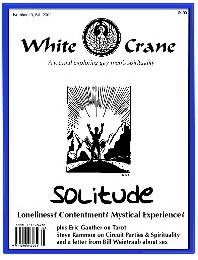
Fall 2000

Return to About White Crane Journal
Feature Section: Solitude
Activism, Contemplation, And The Mystical Body by John Steczynski
Alone, But Not Lonely by Charles Bidwell
Solitude in Nature by Javier Millan
Second Chance by Roy Cameron
Coming Out as an Angel by Dr. Li
Solitude and Turning Inward by Edward Jeffrey Hale
Quiet Retreat by L.A. Marlowe
Lessons in the Silence by John R. Stowe
Awakening Individual Divine Spirituality by Paul Harris
Grieving, Loneliness and the Gay Man by Philip Belmont
Restoring the Real Magick of Daily Life by Hyperion
Solitude and Ecstasy by Donald Dimock
Monastic Solitude & a Gay Monk by Daniel Kelliher

Circuit Spirit by Steve Kammon
Solitude, Silence and Solidarity by Patrick W. Collins
Embodied solitude by Wendelin Merlin
Spend A Day Alone by Michael Goddart
Every Life Emanates Outward by Krandall Kraus
Bodhisattva Watch: Never go cross-grained to the Universe
He never spoke with any bitterness at all, no matter how awful the things he said. Are there really people without resentment, without hate. People who never go cross-grained to the universe? Who recognize evil, and resist evil, and yet are utterly unaffected by it?
Of course there are. Countless, the living and the dead. Those who have returned in pure compassion to the wheel, those who follow the way that cannot be followed without knowing they follow it, the sharecropper's wife in Alabama and the lama in Tibet and the entomologist in Peru and the millworker in Odessa and the greengrocer in London and the goatherd in Nigeria and the old, old man sharpening a stick by a dry streambed somewhere in Australia, and all the others. There is no one of use who has not known them. There are enough of them, enough to keep us going.Perhaps.---describing George Orr, the protagonist of Ursula LeGuin's mystical science fiction novel, The Lathe of Heaven, p. 99
Joseph Campbell: Return from Solitude
When the hero-quest has been accomplished, through penetration to the source, or through the grace of some male or female, human or animal, personification, the adventurer still must return with his life-transmuting trophy. The full round, the norm of the monomyth, requires that the hero shall now begin the labor of bringing the runes of wisdom, the Golden Fleece, or his sleeping [prince or] princess, back into the kingdom of humanity, where the boon may redound to the renewing of the community, the nation, the planet, or the ten thousand worlds. (The Hero with a Thousand Faces)
While not himself gay, Joseph Campbell taught--and popularized--a vision of religious meaning and mythic evolution that gay people can embrace. Keeping alive this vision is the work of the Joseph Campbell & Marija Gimbutas Library on the campus of Pacifica Graduate Institute near Santa Barbara. Membership in the Library supports the kind of revolution in religion most of us seek. Write Campbell & Gimbutas Library, 249 Lambert Rd, Carpinteria CA 93013
Responding to Spiritual Violence
by Darren Grey
Resuscitating The Body Politicby Eric Rofes

Reviews
Tarot and Psychology: Spectrums of Possibility by Arthur Rosengarten, Ph.D.
reviewed by Eric Ganther
In September, the Light Changes by Andrew Holleran
reviewed by Michael Goddart
Working With AIDS Bereavement by Peter B. Goldblum & Sarah Erickson
reviewed by Michael Shernoff
Golden Men: The Power of Gay Midlife by Harold Kooden
reviewed by Michael Shernoff

Letters to the editor: Bill Weintraub responds to Andrew Brooks about Cock-rubbing
For Your Information: Ads and Subscriber Announcements in Current issue
Call for Submissions
The next issue of White Crane, #47, scheduled for Winter 2000/01, will feature articles on Sacred Scriptures. Bo Young will edit the feature section.
There has necessarily been a transformation in how the "revealed" texts of the world's religions are understood. In a world full of books, written texts are no longer sacred just because they have been written down and preserved through time. Ideas about revelation have to change as history changes. Certainly, for instance, the failure of the Bible to recognize homosexuality as a psychological category demonstrates that even "revealed writings" are time bound. What does gay experience tell us about such historical documents? How can we think about such scriptures? How are we writing new scriptures today?
Spring 01 will feature articles on The Shadow. Summer 01 on Love & Joy. Fall 01 on Gender. Winter 01/02 on Intention. Spring 02 on Pleasure. Contributions are invited on these --and any other--topics of interest to a gay readership.
Last update Sept 21 2000